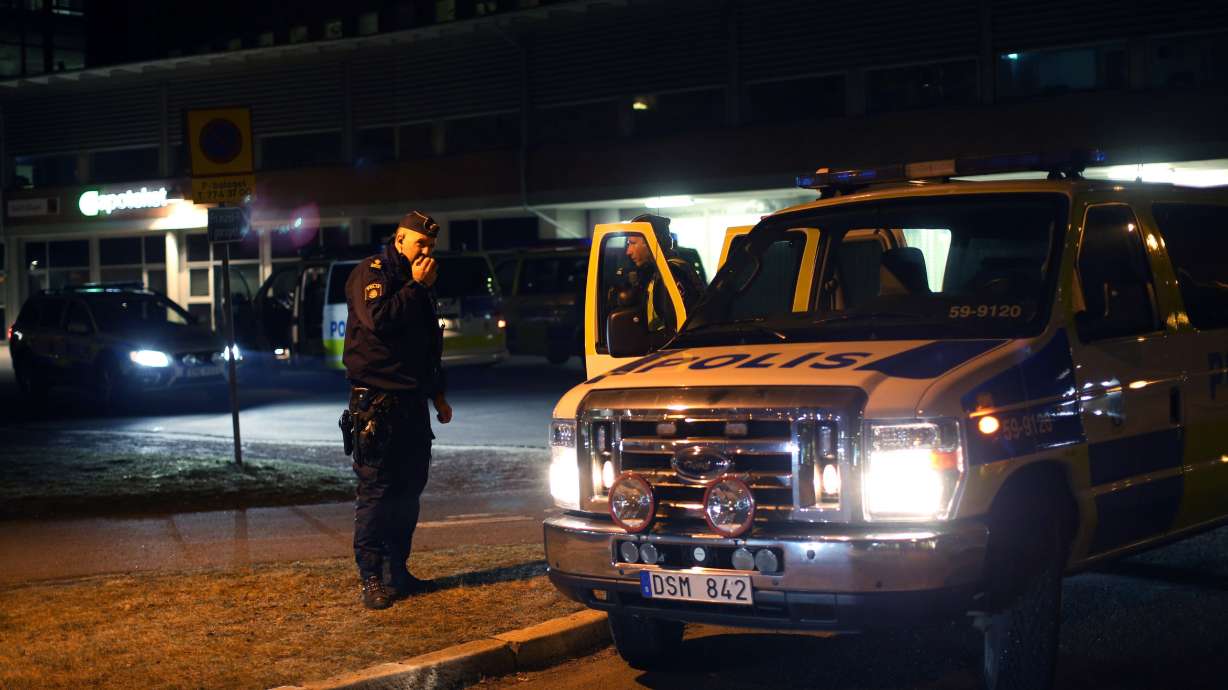Estimated read time: 3-4 minutes
This archived news story is available only for your personal, non-commercial use. Information in the story may be outdated or superseded by additional information. Reading or replaying the story in its archived form does not constitute a republication of the story.
STOCKHOLM (AP) — A deadly restaurant shooting in Sweden's second-largest city shows the Scandinavian country is not the peaceful oasis that it's sometimes made out to be.
While violent crime is low compared to the U.S., Swedish cities including Stockholm, Goteborg and Malmo are dealing with the same kind of gang violence that you find — on a bigger scale — in American cities.
Police say the shooting late Wednesday in Goteborg, when gunmen with automatic weapons opened fire inside a crowded restaurant, killing two people and wounding about a dozen, was likely connected to gang feuds that have escalated in recent years.
"We have a serious situation in Goteborg where many people have been murdered," regional police chief Klas Friberg said. "We have different types of criminal gangs who ... are ready to use aggravated violence in retribution attacks or to win market share."
In egalitarian Sweden, even the poorest neighborhoods appear well-off compared to the most neglected areas of major U.S. cities. But like in many cities across Europe, a sub-culture glorifying violence has taken root among some youth in immigrant suburbs who feel cut off from the rest of society. Many of them identify with a "ghetto lifestyle that you find in slums of U.S. cities," said Sven Granath, an expert at the Swedish National Council for Crime Prevention.
There are also concerns over extremism: The Swedish security service said Wednesday that about 250 people have left Sweden for Syria and Iraq to join the Islamic State group and other al-Qaida inspired groups. Many, though not all, were recruited in immigrant neighborhoods in Sweden's main cities, including Goteborg.
Sweden's homicide rate has been steady in the past decade but police say they've seen an increase in shooting incidents in the major cities as part of turf wars between criminal gangs.
"We have had organized crime before. But the brutal showdowns we see now are relatively new," said Jerzy Sarnecki, a criminology professor at Stockholm University.
In 2013, there were 87 homicides reported in Sweden, a country with a population of about 10 million. About one-quarter of the homicides were in the greater Goteborg area, according to the Swedish National Council for Crime Prevention. Chicago alone recorded 415 homicides that year — and that was the lowest level since 1965.
Wednesday's shooting happened in Biskopsgarden, a Goteborg suburb where rival gangs have been fighting for control of the illegal drug trade. Some say the gangs aren't highly organized, but loosely knit groups of young men with fluctuating allegiances.
"They can be best friends one day and mortal enemies the next," Sarnecki said.
Witnesses told Swedish media that two masked gunmen carrying automatic weapons stormed into the tavern as people were watching a Champions League soccer match.
Police said the victims were two men in their 20s, but didn't identify them. Eight wounded people were taken to the hospital. Two of them were in serious condition a day after the shooting.
Though police had not identified any suspects on Thursday, Friberg, the police chief, said investigators believe "that this incident has to do with ongoing gang conflicts in Goteborg."
He said police stepped up its efforts to combat criminal gangs in the city a year and a half ago, leading to the prosecution of about 60 people for serious offenses and the seizure of about 200 weapons, including 50 automatic guns. Still, they didn't see the attack coming.
"We have maybe about 100 men in different gangs who are ready to use violence or commit crimes," Friberg said. "They think about crime 24 hours a day, seven days a week. It's impossible for us to be everywhere."
___
AP writer Jan M. Olsen in Copenhagen contributed to this report.
Copyright © The Associated Press. All rights reserved. This material may not be published, broadcast, rewritten or redistributed.








